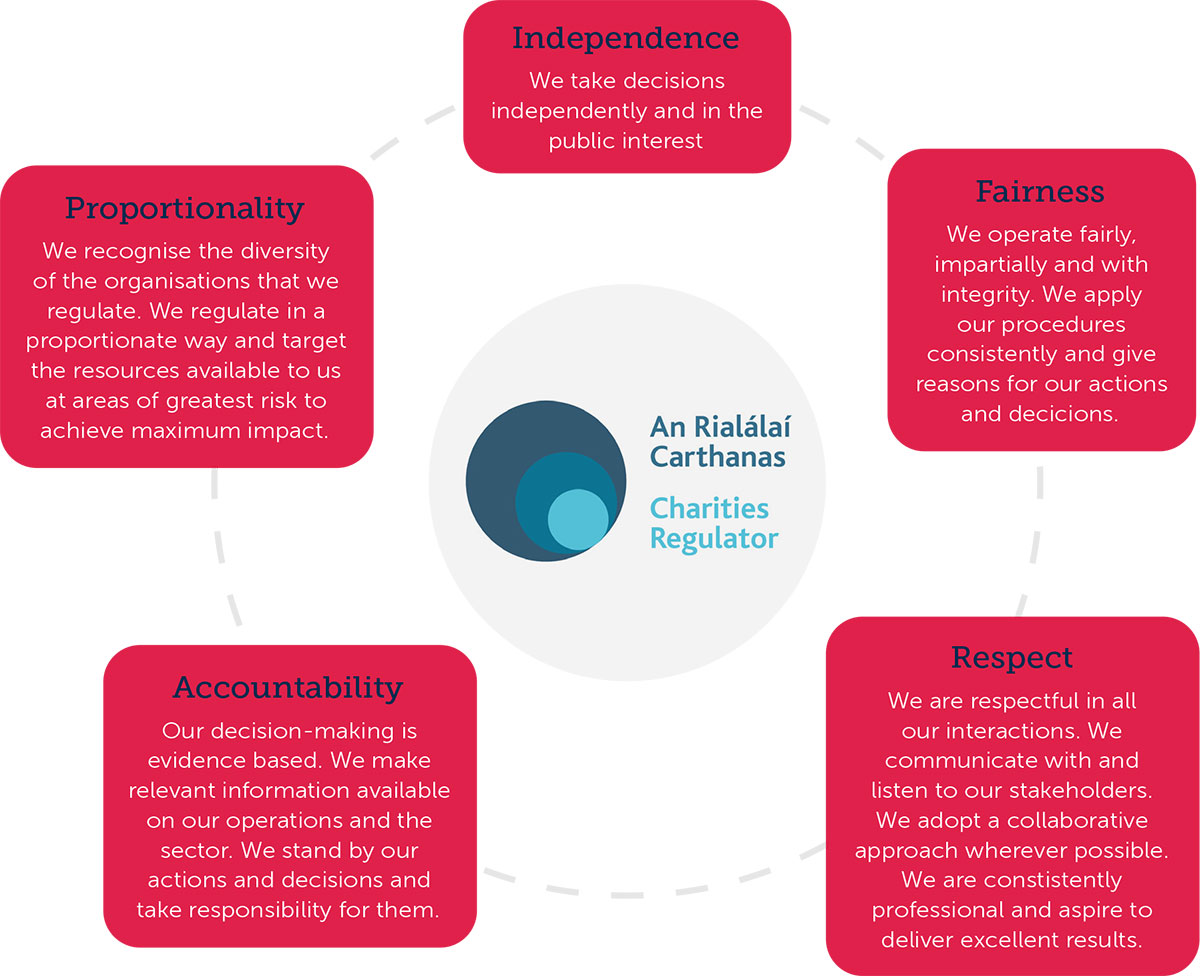FINANCIAL REPORTING
Charities Regulator Targeted Compliance Programme by Sinead Spencer
Compliance Programme

Aligning with their core values of Independence, Fairness, Respect, Accountability and Proportionality, the Charities Regulator regulate the charity sector in the public interest to ensure compliance with charity law and support best practice in the governance and administration of charities.
Helen Martin, CEO of the Charity Regulator advises that they are “working to increase public trust and confidence in management and administration of charitable trust and charitable organisations” resulting in the following functions:
- increase public trust and confidence in the management and administration of charitable trusts and charitable organisations;
- promote compliance by charity trustees with their duties in the control and management of charitable trusts and charitable organisations;
- promote the effective use of the property of charitable trusts or charitable organisations;
- ensure the accountability of charitable organisations to donors and beneficiaries of charitable gifts, and the public;
- promote understanding of the requirement that charitable purposes confer a public benefit;
- establish and maintain a register of charitable organisations;
- ensure and monitor compliance by charitable organisations with the Charities Act;
- carry out investigations in accordance with the Charities Act;
- encourage and facilitate the better administration and management of charitable organisations by the provision of information or advice, including in particular by way of issuing (or, as it considers appropriate, approving) guidelines, codes of conduct, and model constitutional documents;
- carry on such activities or publish such information (including statistical information) concerning charitable organisations and charitable trusts as it considers appropriate;
- provide information (including statistical information) or advice, or make proposals, to the Minister on matters relating to the functions of the Charities Regulator.
As part of the Charity Regulators key functions, they have established and maintain a public register of charitable organisations operating in Ireland. Every charity on the Register of Charities must file an Annual Report with the Charities Regulator within 10 months of their financial year end, as required by section 52 of the Charities Act 2009 (“the Act”). https://www.irishstatutebook.ie/eli/2009/act/6/enacted/en/print#sec10
Aside from complying with the law, submitting an Annual Report provides charities with an excellent opportunity to showcase the good work that they do and to demonstrate their commitment to good governance, transparency and accountability.
Annual Reports are submitted by the charity online through their ‘Charities Regulator Account’. The Annual Report describes the charities activities and financial affairs for the preceding twelve months. The contents of the report are published in the online Public Register of Charities and help to inform the donors and the general public of:
- What your charity has done over the last 12 months to further each of its charitable purposes.
The charity is required to describe its activities during the reporting period, demonstrating that they have undertaken activities in furtherance of its charitable purposes.
- Who your charity has helped.
The charity is required to indicate the section(s) of society that have benefited from their work, the number of people that have volunteered with them during the year and the number of staff employed by them.
- How your charity raised and spent funds.
The charity is required to provide details of its gross income and expenditure, this includes the sources of the charity’s income and how much they have spent on staff costs over the year.
They are also required to report on their total assets and liabilities including cash at bank and on hand, other assets and total liabilities and to declare any audit opinions.
- Where the benefits of the charity’s work were felt.
The charity is required to declare total income received from outside the state, total funds spent or transferred outside the state and methods used to transfer those funds in or out of the state (e.g., Irish bank, An Post etc.).
The Charities Regulator may, in some circumstances, require additional information or documents.
2021 was the first year that charities were required to report on their level of compliance with the Charities Governance code when filing their annual report with the Charities Regulator. This provides greater transparency which research shows is linked to public trust in the sector. When charities file their annual report, they declare if their charity:
- is fully compliant with the Charities Governance Code;
- is partially compliant with the Charities Governance Code;
- has not started implementing the Charities Governance Code; or
- prefers not to say whether it is in compliance with the Charities Governance Code.
Where charities are partially compliant or have not started implementing the Code, they can explain what standards they are not in compliance with and why, or why they have not started to comply.
If the charity is not complying with the Code, the Charities Regulator will ask the charity to explain why. Valid reasons for non-compliance may include:
- The charity is in the process of winding up.
- The charity is newly established and needs more time to fully comply.
To comply with the Code, the charity must complete a Compliance Record Form every year. On the form, the charity needs to identify the actions taken in the year to meet each standard. The Compliance Record Form is not submitted to the Charities Regulator but should be made available to them, if requested.
Declaring their level of compliance gives charity trustees an opportunity to inform donors and other stakeholders of their progress in complying with the Governance Code.
In 2021, 6,150 charities submitted a Governance Code compliance declaration. Twelve months later in December 2022, the number of charities that submitted the declaration increased by 5% to 6,437.

There was also a slight (3%) reduction in the number of charities who declared themselves to be partially compliant. This reduction is due to charities moving from partially compliant to fully compliant. The option for charities not to declare their compliance status at the time of filing the annual report was added to the compliance declaration for December 2021, and was chosen by 504 charities.
Failure to file an Annual Report on time is an offence under the Act for the charity and its charity trustees. Despite this, the number of charities filing their Annual Report on time has declined in recent years with just 64% of registered charities doing so on time in 2021 (within 10 months of their financial year end).
The Charities Regulator advises that they take a proportionate approach where charities breach the requirements of the Act, and in most cases will seek to work with charities to bring them into compliance in the first instance. However, although reminders are issued in the lead-up to a charity’s filing deadline and when the deadline has passed, some charities still fail to file their Annual Report.
In the interests of transparency and fairness to those charities that do file their Annual Reports on time, the Charities Regulator is adopting a stricter approach to enforcing compliance with this obligation and is currently implementing a targeted compliance programme to increase levels of compliance with annual reporting obligations.
As part of this work, the Charities Regulator is currently making contact with charities and charity trustees that have Annual Reports outstanding for a considerable period to warn them of the possible consequences if they remain in breach of the Act. This includes, possible enforcement action such as prosecution of the charity and the individual charity trustees and /or removal of the charity form the Register of Charities.
The Charities Regulator has published that they encourage all charity trustees to check their charity’s Annual Reporting compliance status. Charities and charity trustees can confirm if they are up to date with their Annual Report filing obligations by checking their charity’s information on the public Register of Charities. Charities who find that they have not submitted their last Annual Report by the 10-month deadline are encouraged to take immediate action and arrange for the submission of the Annual Report as a matter of urgency.

Director at KOSI Corporation Limited